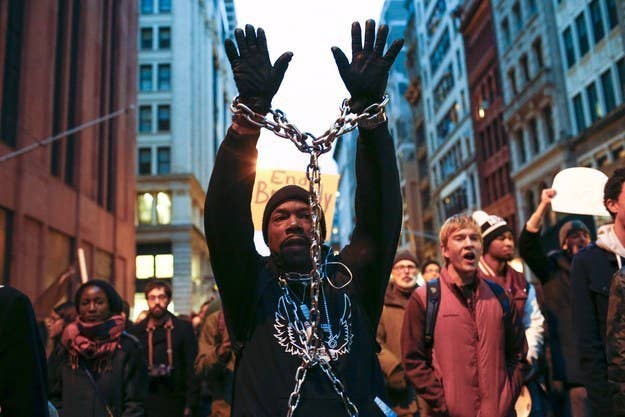
In recent weeks, police forces across the country have grown defensive after deaths caused by police officers have pushed thousands of protesters into the streets nationwide, calling for nothing less than a fundamental change in how police do business.
In the middle of all this, the White House is promising a major report on policing. On Thursday, top officials promised the report would be ready by early March, in keeping with a 90-day timeline President Obama created for his Task Force on 21st Century Policing when it was announced Dec. 1. Top White House adviser Valerie Jarrett and Ron Davis, director of the Community Oriented Policing Services Office at the Department of Justice, announced the list of task-force members on a conference call and discussed their mission.
Davis acknowledged many cops are not in the mood to listen to protesters at the moment. But the officials insist police on the whole are ready to change.
"It's tough right now, because obviously rank-and-file officers feel like everything is focused on them," Davis said in response to a question from BuzzFeed News. "But the other part the task force will do, it will model the behavior we would want to see at the local level. And that is, people coming together, diverse perspectives, diverse views, law enforcement, youth, civili rights organizations. People that maybe even historically have not agreed…will disagree without being disagreeable and learn how to work the solutions and problems."
The existence of the task force itself could help salvage the broken-down relations between many police forces and local activists, Davis said. The White House began examining police relations even before the Michael Brown shooting put the topic on the national agenda, he said. But with tensions at an all-time high, the administration wants solutions quickly.
"We hope that will be a model so these discussions can continue all over the country," he said. "But the discussions, and I think that's why the task force is set with a time period, need to turn into concrete action quickly."
Recent days have seen more and more police vocally express their frustrations over continuing protests after the deaths of Brown in Ferguson, Missouri, Tamir Rice in Cleveland, and Eric Garner in New York City. Last week, the International Union of Police Associations complained to the AFL-CIO that the umbrella organization wasn't doing enough to quell rhetoric among other AFL-CIO unions IUPA saw as anti-police. On Tuesday, the president of the Cleveland Police Patrolman Union dismissed critics of the Rice shooting, claiming the only lesson to be learned from the incident is "when we tell you to do something, do it." Audio leaked Thursday from a private meeting of New York City police officers a union leader warned "enemies" of the police were in charge in the city.
"The rules are made by them to hurt you," the union leader told assembled officers.
The White House 21st Century Policing task force includes a number of top police officials and is co-chaired by Charles Ramsey, Philadelphia police commissioner.
Jarrett said police leaders are ready to embrace change.
"I remember specifically the executive director of the chiefs of police said police are very interested in making sure police are always looking at best practices," she said, recalling a recent White House meeting on police-community relations. "They deserve, as the Attorney General said in that meeting, to go home at night too. And they'll be safer if there's more trust built between the community and them."
Jarrett also acknowledged fixing police relations at a time when activists and cops are more divided than ever is a tall order. She said the task force will hit its deadline but also noted that it might continue working after the initial report is finished. Other efforts aimed at police, such as a promised presidential executive order that will alter the way federal programs that funnel military hardware to local police work, will come early next year, Jarrett said.
"There's a spirit in this country that is motivated toward change," Jarrett said of the task force efforts. "It's going to be difficult, it's going to be challenging, maybe tense. Some of them may be very uncomfortable. But I think that what the president is determined to do is create an atmosphere where we can have this conversation safely."
